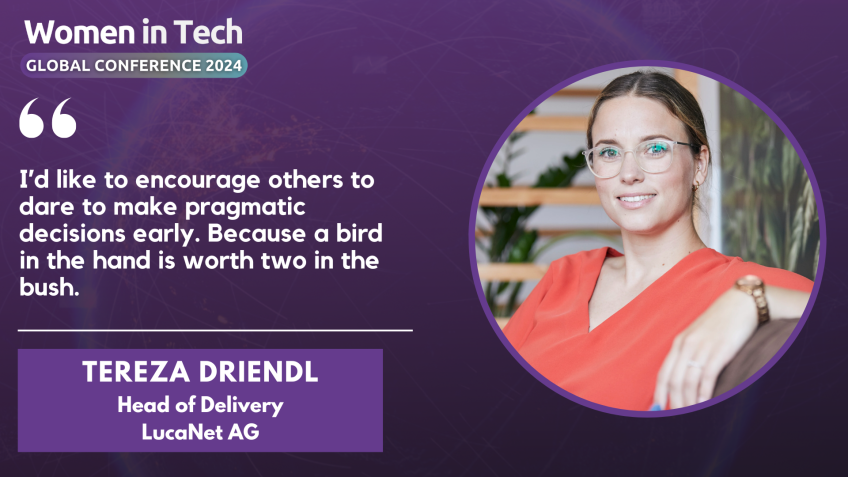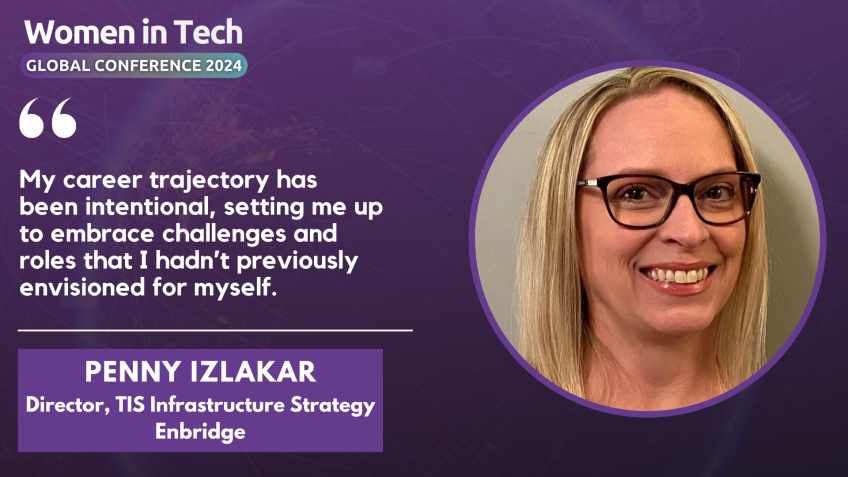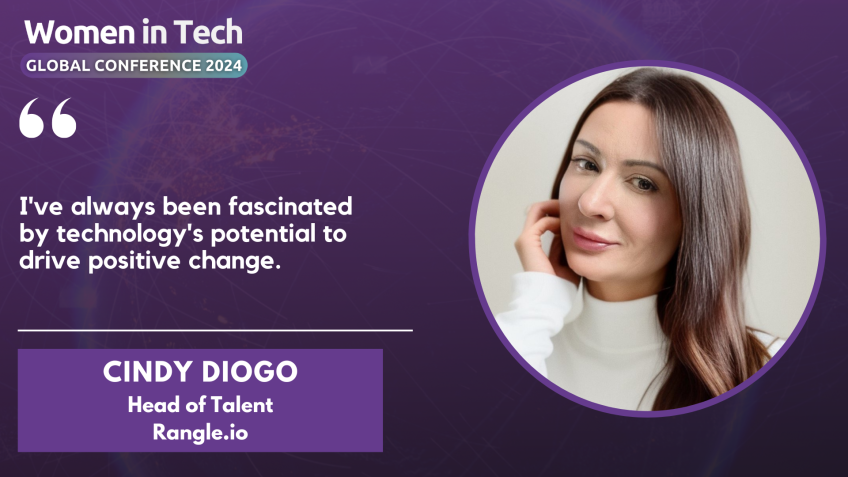Making it as an immigrant woman leader in tech
Trishala Pavagada
VP of EngineeringMaking it as an Immigrant Woman Leader in Tech
Hello, I'm Trisha La Paga, a proud immigrant woman, currently a VP of Engineering at 59. My journey to leadership has been full of learnings and insights, which I hope to share with you today.
Taking the Plunge – How it Started
It was 2006, while at HP, my Q A team in India reported a regression bug late at night. Despite the late hour, I decided to fix it to maintain the work momentum.
The next day, my manager appreciated my effort. To me, it was just doing my job. Much later, as I read Sheryl Sandberg's Lean In, I realized how often women downplay their contributions and achievements. That was the moment it hit me - we need to acknowledge our contributions, no matter how small they seem.
My Professional Identity
Being an engineer and an engineering leader matters a lot to me, next only to being a mom and a wife. My professional passion lies in building diverse teams with a focus on innovation. However, my journey from India to the engineering world of the USA has been anything but easy, and herein lie some important lessons for aspiring women leaders.
Countering Setbacks
When I moved to the US in 2003, I sought a job that would help me secure a work visa. However, securing a job after a career break presented its own set of challenges. My initial belief – hard work equals success – began to waver as the rewards didn't match my efforts.
After some self-reflection, I concluded that being an immigrant woman seemed to slow down my career progress, and my confidence took a hit. But all of it was about to change.
Learning and Rebuilding
Joining Cisco in 2015 marked a significant turn in my life. I not only received appreciation from my manager for my hard work but also got advice to better advocate for myself.
This gave me an opportunity to observe my peers and learn from their skills, like presenting work effectively, selling their work subtly, offering opinions, and making suggestions. These insights, along with mentorship, feedback, coaching, trainings, and books, helped me identify and overcome the barriers I had unknowingly set for myself.
Pushing Out of my Comfort Zone
Real growth happens outside the comfort zone, and I realized it was essential to recognize when I was in mine. Every new role, team, or project may bring uncertainty and a bit of nervousness - it's a sign of new learning and growth opportunities. Do not let impostor syndrome or fear of failure hold you back.
Building Relationships
Collaboration and cross-functional relationships are crucial, especially in senior roles where you need to influence without authority. Expanding your network beyond your immediate team helps you gain different perspectives and expand your skills.
- Seeking mentorship: You're never alone. There's always someone out there who’s traveled the path you're on. Reach out to them.
- Finding sponsors: Sponsors can accelerate your career. But remember, being visible and advocating for yourself is essential.
- Self advocacy: Speaking out for your needs, wants, and achievements is essential. Use "I" to emphasize your individual contributions.
Discovering Authentic Leadership
Authenticity in leadership is about showing up as your true self, which is heavily influenced by self-awareness, understanding your motivations, defining your core values, and building trust. Remember, trust brings engagement.
Final Thoughts
As you embark on your own journey, I want to leave you with some parting words. Always believe in yourself, especially when entering a new environment. Embrace the new and never settle for less.
Remember, success is a combination of your hard work, your attitude, and a hint of luck. Therefore, put in the hard work, build the right attitude, and let luck find you. You may face challenges along the way, as I did, but remember, each setback is an opportunity for a significant comeback.
Keep reaching for the stars!
Video Transcription
Hi. Back in 2006, I was at HP my Q A team which was in India, send a regression bug at 10:30 p.m. I was up, I decided to fix and unblock the team.The next day, my manager stopped by at my desk and thanked me for fixing the bug and for going above and beyond. I was surprised I did not know how to react this. I was just doing my job much later when I was reading Sheryl Sandberg's book Lean In, I realized that many of us women tend to dismiss these little things that we do as something just of the Norman and you'll soon know why? Hi, I'm Trisha La Paga. And today I will be talking to you about making it as an immigrant woman leader in the tech industry. Uh If you ask me for an introduction, I would say I am a mom, a wife, an engineer and an engineering leader. In that order. I work as a VP of engineering at 59. I lead the core engineering team there um building the best in class contact center solution. I've had engineering leadership positions both in small and big companies. And my passion is for building teams, diverse teams actually uh with focus on innovation. I was born in India. My parents came from a very conservative background. And when growing up, there was a lot of emphasis on academics.
In those days, the career choices for you to be successful were pretty limited. Um you could be a doctor, you could be an engineer, maybe a lawyer for me. My mom was a doctor and my dad was an engineer. So it was pretty much decided my parents worked very hard to do well for themselves in their respective fields. Uh And from a very young age, it was imbibed in me that it is important to work hard, work hard and you will succeed was what I believed in culturally. It was ok to be in the shadows because your work spoke for itself. Any additional marketing that you would like to do about your work would be considered as bragging. Speaking out of turn meetings was rude and challenging. Senior team members was a no, no, I'm sure these things have changed over the years, but this is what it was then. And I followed these rules. I did well in my career, I moved to the US in 2003 as um with many other um women. I, when I came here to the U SI did not have a work visa yet. Um So I had to find a visa. Sponsor. This was the first biggest hurdle that I had to overcome as an immigrant. I was very determined to establish a career. Um I looked for a job and it took a while, but I was able to find an employer who could sponsor my visa.
However, I had had a career break when I got my job, I was super excited. Um I wanted to pick up where I left off. I learned fast. I worked hard so it should not be difficult for me to make up for the time I had lost, right? I was in a bit of a rude shock. The cultural playbook that had worked for me so far did not seem to be helping me anymore. I was learning fast. I was working hard, but somehow I felt that the rewards were not per my expectations. My answer to that was let me work even harder. I took on more work I put in long hours, I delivered more. But somehow there was that nagging feeling that there was no alignment with what I was doing and the incentive I was getting for a really long time. I was not able to point to the specific reason for this. I assumed that this was probably because I was a woman and I was an immigrant and these two factors were holding me back. My confidence took a hit, my ambitions took a back seat and I became complacent with my career growth. I had a job, I was earning money. So I was happy. So why not just put my career in cruise? Things changed when I joined Cisco in 2015. Uh As usual, I joined the team ramped up very quickly became a key member of the team.
Uh This time around the difference was my manager, not only appreciated my work but also told me that I was doing some really good work but not advocating for the work that I was doing. So, this was my aha moment I started to observe what others were doing better than me. And I started to see how some of my coworkers were able to eloquently present the work that they were doing. They were subtly selling their work when they had an opinion or a suggestion. They did not hesitate to watch this and it was actually valued. I had suddenly discovered the gaps that I had and now I had an opportunity to rebuild my career. I sought mentorship feedback. I hired a coach, I read books, I took training. I was determined to overcome the barriers that I had created for myself. Since then, I have continuously tried to learn from things and people around me. And today I would like to share what I learned in this journey. Uh As I said, you know, because my confidence took a hit at some point of time, I became very complacent with my career growth. So the first thing that I had to do was essentially to push myself out of my comfort zone. Uh The way to start doing this is to be able to recognize that you are in your comfort zone and to also acknowledge it, if you were to start something new and you felt that, you know, this was easy or this was, I've been there, done that kind of thing, then you're definitely in your comfort zone.
Even to this day when I start something new, I take on a new team or I take on a new project, I feel a certain amount of nervousness in me. And there is a certain uncertainty when you feel this embrace it. It's important to challenge yourself constantly. And this nervousness is a good kind of nervousness. In fact, if I don't feel this nervousness, now I would be concerned. It is uh remember when you are in such new uncomfortable situations and you're venturing into the unknown your impostor syndrome pretty much kicks in immediately that voice in your head says, no, you cannot do this. But this is the time when you have to bring your growth mindset into full care, you know, uh believe in yourself, will things go your way? Maybe not. But take this as a learning opportunity to grow. The very first time I put this into practice was back in Cisco, I was given an opportunity to lead a project as the technical lead. This project spanned about 20 plus teams. The my first instinct was I cannot do this, but I felt like I have to challenge myself uh over the execution of this project. We had several ups and downs. Uh but we landed the project successfully.
Something that was really important that I learned here was, you know, your expertise definitely plays a significant role in making something successful. But more importantly, the relationships that I had built over the years made it easy for me to be able to influence, to get the outcome that I wanted. So the next aspect that I learned through my journey was building relationships. I'm going to highlight like three different kinds of relationships that I have found have been like very impactful in my life. Building relationships by the way, has to be a part of your job, especially as you grow into senior roles. Uh It's a big part of your job because you have to influence with or without authority. This may not naturally come to many of us. But nevertheless, it's important. Collaboration is very important, especially when you're working in team environments because you need to align and achieve goals and you cannot do that without collaboration. And building relationships with your coworkers will help build the trust, make it easier to communicate and cooperate.
So when I take in a new team or I'm join a new company, I always make sure that I'm making those connections as a really high priority by the way, it is not enough, if you just, you know, are connecting with your immediate teams or teams that you work with regularly, it is very, very important to expand that network beyond that, to, to uh talk to other teams internally and also build external networks.
The reason is when you go beyond this first circle, you end up gaining more perspectives and have an opportunity to expand your skills. One of the most effective ways that I have found to expand my network, especially internal network is to seek opportunities where I can interact more with cross functional teams that I do not work with regularly. Uh An example was in my prior job for a short period of time, I had to play the role of a product manager. In addition to my day job as the engineering leader playing this role, brought in a completely different perspective about how to build products in this role. I was interacting a lot more with customer facing teams. I always thought that I had customer empathy and I emphasized that when I was building products, but working with these teams showed me customer empathy in a completely different lens. And this I think is a super valuable experience that I continue to apply. When I lead teams today, my career has benefited a lot by having mentors and sponsors. Remember if you are working on some kind of a problem, there is probably somebody in your network or somebody outside of your network who has probably traveled down that path already.
So then why work in solos? Why not go ahead and brainstorm with them? Uh One of the big challenges that I've seen that most mentees face is actually to go and seek that mentorship to ask for that time because most mentees think that they're wasting their mentors time and it's precious. But what I have actually experienced is most of my mentors have been more than happy to give me that time and also have found these conversations very useful to them because mentorship is actually sometimes a two way conversation. It's not just a one way. Uh Mentorship also does not have to be a continuous relationship so it can be context specific. So you could actually have a few sessions with somebody who can help you out with whatever you're dealing with. The importance of sponsors was something that I realized pretty late in my career. Sponsors play a big role in accelerating your career. Uh Luckily, for me, uh my past life, I did not have to seek sponsors, but it is perfectly ok to do that. And I will do that um in the future, uh sponsorship may or may not start with mentoring. But one thing that helps in seeking sponsorship is being able to provide visibility and recognition to your work. And this is where self advocacy comes into picture.
Self advocacy is an essential skill. And this by the way was the biggest gap that I was uh told when, you know, I was trying to search for answers of why I was not growing. Uh in order to be able to self advocate for yourself, it is important to know what you want, that promotion, that race, that project that you want to work on. Or just if you want to create a boundary around yourself, you need to know what you want because that will help you to build a structured approach for speaking up for yourself. It is important to take ownership. And when you talk about ownership, it is not just about, you know, owning and working on the task that you are assigned, it is actually about taking credit for the work that you're doing in a team based environment. Um It is very natural that when we talk, we talk in terms of we, we did that we accomplished that it is very, very important to do this. But in addition, it is also equally important for you to highlight what is your specific contribution? What was your specific impact?
So use the I word generously and this is again, something that I learned, you know, I have a tendency to always go with just the we and omitting out the I and I actually have to practice doing the I in addition, speak confidently words such as I think probably maybe this undermine the message that you're trying to say and on top of that, you know, don't hesitate to, to your own hand.
Don't make the mistake that I made at HP where I felt uncomfortable taking the credit for what I was doing, celebrate your successes even though you think that it is trivial. I think that's very important as I learned some of these things I sought to self reflect and figure out what my own style of leadership was. And I started to read about being authentic in the leadership style. And so what is authenticity, authenticity is about showing up as your true self? What is true self then true self is about knowing how you would operate in certain specific situations. What you would talk, how you would react to certain things. Um This behavior comes from being self-aware.
Self-aware is about knowing how you're feeling what you're thinking or what your beliefs are at any given point of time. Having this kind of self-awareness gives you the leverage of being able to control how you're interacting with people. It also helps you manage your emotions more effectively as contradictory as it may sound. You know, self awareness can actually be practiced. You can build self awareness by self reflection. One of the things that I have started doing more recently is when something different happens at work, maybe something that made me feel good or maybe something that was frustrating. I end up making little notes of that. Uh This way I can go back to it sometime and see and recognize, you know, what works well and how I can do that again, I can repeat it and play to my strengths and at the same time, what should I be doing better? So I don't get into situations where I'm frustrated or I feel like, you know, I cannot get my voice heard uh by talking about self reflections. Uh It is also important to understand what your intrinsic and extrinsic motivations are. Extrinsic motivations are generally driven by outcomes.
Um Things like I said, you know, promotions or you wanting to get that job that in a company where you have always wanted to work for. Uh intrinsic motivations are things that give you self satisfaction. It could be as simple as, you know, I got my work done even though I had a million meetings on my calendar today as um you know, uh once you understand your motivations, it helps you actually build your value system and values are really, really important. Uh values are what define leaders and organizations on, you know, how they operate or they're very core to our belief system, we hold them dearly and they actually influence our motivations and fears. Values can actually trigger emotions. Authentic leaders, you define their value system and use this value system in their uh decision making process values themselves can actually be negotiable or non negotiable. Uh a non-negotiable value for me, for example, as I put my family above everything else. And that's just not negotiable now, whereas I can uh one of the other values that I have is accountability and I may refine it depending on the context. Sometimes I have accountability by ownership, sometimes I have accountability by delegation our life experiences influence our value system significantly.
So it is important for us to think back and look back at the people who've had an impact on us and the experiences that have made an impact on us. Uh as an example, um as an immigrant, I was exposed to multiple cultures. And over the years, as I have worked with global teams, I feel like I had an additional advantage or, you know, uh having this multicultural background helped me build those relations and trust with a diverse group of people. And again, trust is one of the most important parts of authenticity. When employees trust leaders, there is a lot more engagement, trust comes with transparency in some of the projects where I have been very successful. They've been the ones where um my leaders gave me the psychological safety for being able to do what I thought was, right? And there was a two way trust here. They trusted that I could do things and I trusted that they could essentially uh you know, have my back. If I were to fail, I have been lucky that, you know, I have had be I have been at the right. Place at the right time and with the right people and this has actually acted as a catalyst for my own career growth. Uh What I have learned and I would like to summarize here as my takeaways from my own experience is always believe in yourself.
When you are in a new environment, a new country, a new job, it is important to believe in yourself and embrace that new. Uh again, don't be like me, don't settle for less. Don't assume things don't become complacent. You. Uh When you find yourself at the short end of the stick to take a step back, reassess and act, it is really, really important. I truly believe that being successful is a combination of your hard work, your attitude and a small percentage of luck. So get the hard work and get your attitude so the luck can actually work for you. Thank you.






